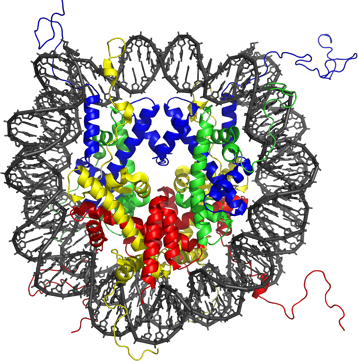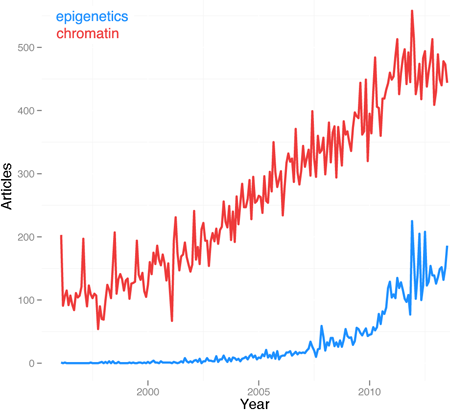•
the Blog
Who understands the histone code?
By Guillaume Filion, filed under
histone code,
position effect variegation,
epigenetics.
• 30 November 2013 •
The most annoying thing about us biologists is that we keep using words that we don’t understand. “Epigenetics” is one of those that has drawn my attention for several years, as I explained in my last post. I suggested that the invasion started in 2001, the year that the histone code hypothesis was proposed by Thomas Jenuwein and David Allis in a seminal paper entitled Translating the Histone Code.
 The histone code hypothesis was arguably the most influential concept of the last decade in molecular biology. Yet, most biologists would be hard pressed to say what the hypothesis is. All you have to do is read what Thomas Jenuwein and David Allis actually wrote. But believe it or not, this blog is one of the only places on the Internet where the histone code hypothesis is spelled out clearly. Most sources, including the Wikipedia article diverge substantially from the original statement, which is the following.
The histone code hypothesis was arguably the most influential concept of the last decade in molecular biology. Yet, most biologists would be hard pressed to say what the hypothesis is. All you have to do is read what Thomas Jenuwein and David Allis actually wrote. But believe it or not, this blog is one of the only places on the Internet where the histone code hypothesis is spelled out clearly. Most sources, including the Wikipedia article diverge substantially from the original statement, which is the following.
Distinct qualities of higher order chromatin, such as euchromatic or heterochromatic domains, are largely dependent on the local concentration and combination of differentially modified nucleosomes.
DNA in the nucleus comes in a structure called the nucleosome. The picture above is a molecular...
The rise of epigenetics
By Guillaume Filion, filed under
chromatin,
histone code,
PubMed,
epigenetics.
• 13 October 2013 •
I started to study biology at the time epigenetics became a buzzword. I first heard the term at university in 2001, and as many young enthusiastic people of the time, I did my PhD on epigenetics because it was cool. But buzzes come and go, I finished my PhD and I got bored with epigenetics. Meanwhile, I thought that my interest had been mirroring that of the community, and that the trend was towards a loss of interest for epigenetics. I was about to write a blog post entitled “The death of epigenetics” when I did a quick PubMed search and realized that the peak of popularity was... 2013. Epigenetics is not dead, it is on the rise!

Above is the number* of PubMed hits for “epigenetics” per month since 1996, with “chromatin” shown as a reference for comparison. PubMed now displays a histogram of the occurrence of your search term over the years (check here for epigenetics). The growth is not due to articles published in late-adopting journals, since the trend-setters Cell, Nature and Science published more than half of their papers labelled “epigenetics” in the last three years.
What is epigenetics anyway?
One of...

